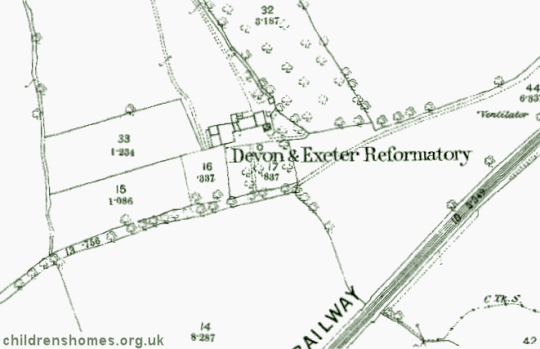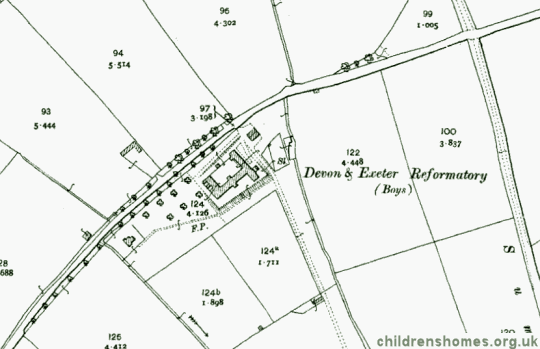Devon and Exeter Reformatory Farm School for Boys / Northbrook Approved School, Exeter, Devon
The Devon and Exeter Reformatory Farm School for Boys was established in 1855 at Brampford Wood, in the parish of Brampford Speke, to the north of Exeter. It was locatd in a cottage on land owned by a leading proponent of the institution, Sir Stafford Nothcote, M.P. The premises were officially certified on April 17th, 1855, to house 30 boys aged from 11 to 15.
An inspection report on the establishment in 1857 noted that the accommodation, which consisted of two cottages that had been joined together, was small and confined. There was also eleven acres of land which the boys cultivated. The buildings were gradually enhanced and by 1880 the farmland extended to 26 acres. The boys sometimes also helped on neighbouring farms. A tailor visited the School occasionally to mend clothes and was assisted by some of the boys.
The location of the Brampford Wood site is shown on the 1889 map below.

Devon and Exeter Reformatory Farm School for Boys site, Exeter, c.1889.
From its opening until their retirement in December 1893, the superintendent and matron of the School were Mr and Mrs Harris. They were replaced by Mr and Mrs J.T. Stephens who were followed in 1897 by Mr and Mrs J.R. Sheppard. Classroom education was conducted for many years by a non-resident schoolmaster who attended in the evenings between 5.30 and 8.30pm. A drill instructor also attended once a week. The agricultural training at the School was supervised by the farm bailiff.
In 1900, the School was relocated to Beacon Lane, Exeter. The purpose-built premises could house up to 55 boys aged 12 to 15 years and received their official certification on September 14th, 1900. The site was described at the time as being 'fairly elevated and in the midst of undulating and open country, about 2 miles from Exeter.' The main building was constructed of red brick, with a fair-sized yard at its rear, and a stretch or grass and arable land in front. As at Brampford Wood, the boys received training in farming and gardening, with carpentry also included on the curriculum.
The location of the Beacon Lane premises is shown on the 1905 map below.

Devon and Exeter Reformatory Farm School for Boys site, Exeter, c.1905.
In 1933, the School became an Approved School for Intermediate Boys, a new type of establishment introduced by the 1933 Children and Young Persons Act to replace the existing Reformatory and Industrial Schools. The School could house up to 50 aged aged 13 to 15.
In 1955, the School merged with the Farringdon House Approved School, then becoming known as Northbrook School and based at the Whipton site.
In 1973, the school became a Community Home with Education (CHE) under the control of Devon County Council. The Home is believed to have closed in around 1983.
The Brampford Wood buildings no longer exist. The Whipton site is now covered by the modern housing of Northbrook Close.
One former Brampford Wood inmate who made good was Leonard Restall, who later served in two Air Forces, went to three Universities in three different countries and written and published three books. He says that the training and discipline gained from the School made all the difference to him. His life memories are contained on his book, My Life of High Adventure. Excerpts from his three books can be found on www.restallsuccess.com.
Records
Note: many repositories impose a closure period of up to 100 years for records identifying individuals. Before travelling a long distance, always check that the records you want to consult will be available.
- Devon Heritage Centre, Great Moor House, Bittern Road, Sowton Exeter EX2 7NL. Holdings include: Committee minutes/reports (1931-55); Visitors' books (1855-1955); Licensing registers (1949-1973); Admission register (1876-94); Discharge register Punishment/detention books (1862-1980s); Medical Officer's daily record of sickness (1940-55); Log books (1942-1980s); Farm account books (1947-71); Medication registers (1979-82); Diaries (1937-81); Pocket money books (1970s-1980s); Post and phone-call books (1970s-1980s). The archives include number of items such as Discharge Registers where it is unclear as to which institution they may relate.
Bibliography
- Carpenter, Mary Reformatory Schools, for the Children of the Perishing and Dangerous Classes, and for Juvenile Offenders (1851, General Books; various reprints available)
- Carlebach, Julius Caring for Children in Trouble (1970, Routledge & Kegan Paul)
- Higginbotham, Peter Children's Homes: A History of Institutional Care for Britain's Young (2017, Pen & Sword)
- Abel Smith, Doroth Crouchfield: A History of the Herts Training School 1857-1982 (2008, Able Publishing)
- Garnett, Emmeline Juvenile offenders in Victorian Lancashire: W J Garnnett and the Bleasdale Reformatory (2008, Regional Heritage Centre, Lancaster University)
- Hicks, J.D. The Yorkshire Catholic Reformatory, Market Weighton (1996, East Yorkshire Local History Society)
- Slocombe, Ivor Wiltshire Reformatory for Boys, Warminster, 1856-1924 (2005, Hobnob Press)
- Duckworth, J.S. The Hardwicke Reformatory School, Gloucestershire (in Transactions of the Bristol and Gloucestershire Archaeological Society, 1995, Vol. 113, 151-165)
- Higginbotham, Peter Children's Homes: A History of Institutional Care for Britain's Young (2017, Pen & Sword)
- Hyland,Jim Yesterday's Answers: Yesterday's Answers: Development and Decline of Schools for Young Offenders (1993, Whiting and Birch)
- Millham, S, Bullock, R, and Cherrett, P After Grace — Teeth: a comparative study of the residential experience of boys in Approved Schools (1975, Chaucer Publishing)
Links
- Red Lodge Museum, Bristol — a former girls' reformatory.
Except where indicated, this page () © Peter Higginbotham. Contents may not be reproduced without permission.


